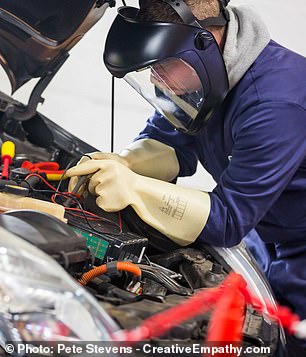Will we have enough skilled mechanics to work on electric vehicles by the end of the decade? IMI says no, based on qualifications trajectory
The Labour government’s plan to reintroduce a ban on sales of new petrol and diesel cars from 2030 and force British drivers to switch to electric vehicles is facing a major hurdle, according to a report this week.
There is a significant skills gap expected for the workforce of mechanics trained to work on electric vehicles, and there is already a shortage of them in some parts of the country.
The latest update from the trade association representing auto industry workers says we are on track to have a shortfall of 3,000 EV mechanics by the beginning of the next decade, rising to 16,000 by 2035.
And in London and the southeast of England, where electric vehicle ownership is highest, there is already a limited workforce of technicians qualified to operate battery-powered cars.
The latest EV TechSafe certification data from the Institute of the Automotive Industry (IMI) shows that 58,800 technicians are now qualified to work on electric vehicles.
This is the nationally recognised qualification required to provide after-sales services, such as repairs and maintenance, for electric cars.
The nearly 60,000 automotive professionals certified for electric vehicles represent less than a quarter (24 per cent) of the UK automotive workforce.
They are currently responsible for the maintenance and servicing of the 1.1 million battery-powered cars already on British roads.

Based on current forecasts for the increase in the number of electric cars on the road, IMI says Britain needs 124,000 trained mechanics by 2031, but is on track to have just 121,000.

This skills gap could widen if Prime Minister Keir Starmer accelerates the ban on sales of new petrol cars until 2030
However, with Keir Starmer widely expected to reintroduce a ban on new petrol and diesel car sales from 2030, the automotive industry body is increasingly concerned that garages may be short of staff to cope with an acceleration in the number of electric vehicles.
Based on current projections for the increase in the number of electric cars on the road in the run-up to the ban on petrol and diesel vehicles in 2035, IMI estimates that 124,000 after-sales technicians will be needed by 2031.
Following the current trajectory of mechanics gaining qualifications, he says there will be only 121,000 certified technicians to work in them by the same date.
IMI believes that by 2035, there will be a need for 166,000 mechanics trained for electric vehicles.
However, the rate of qualifications suggests there will only be around 150,000.
If the Prime Minister accelerates the ban to 2030, the shortage of EV mechanics could increase dramatically in the first half of the next decade.
“There has been encouraging growth in the number of technicians achieving EV certification so far in 2024,” said Kevin Finn, IMI’s chief executive.
‘However, with the new administration’s expected reinstatement of the ICE ban deadline in 2030, the skills gap persists.
‘Automotive companies urgently need to prioritize training more technicians so that the expected growing number of EV owners can find a qualified local technician to safely work on their vehicle.’
London and the South East may already have a shortage of electric vehicle mechanics
The latest IMI data illustrates the ongoing postcode lottery for EV skills and suggests some areas may already have a shortfall.
The two regions highlighted as having potentially unbalanced availability of electric car mechanics are London and the South East, the parts of the country with the most electric vehicles on the road.

London and the South East have the highest volumes of ‘plug-in electric cars’, but not the highest proportion of qualified EV mechanics.

IMI warns car companies that they urgently need to prioritise training so that the expected growing number of EV owners can “find a qualified local technician to safely work on their vehicle”.
According to figures from the Society of Motor Manufacturers and Traders published in April, the two areas have almost 530,000 plug-in electric vehicles (both full electric vehicles and plug-in hybrids), accounting for about 5.9 percent of all cars on the roads there.
However, London and the South East do not have the highest proportion of certified EV technicians.
According to IMI, only 6.1 percent and 6.4 percent of technicians respectively are trained to use electric vehicles.
In contrast, the East of England is the region with the highest proportion of qualified EV mechanics (9.5 per cent), while Northern Ireland has the lowest rate at just 3.7 per cent.

Some links in this article may be affiliate links. If you click on them we may earn a small commission. This helps us fund This Is Money and keep it free to use. We do not write articles to promote products. We do not allow any commercial relationships to affect our editorial independence.

